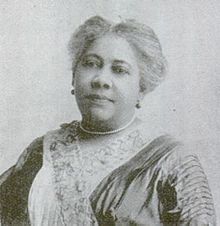Mary Burnett Talbert | |
|---|---|
 | |
| Born | September 17, 1866 Oberlin, Ohio, U.S. |
| Died | October 15, 1923 (aged 57) |
| Resting place | Forest Lawn Cemetery, Buffalo, New York |
| Nationality | American |
| Alma mater | Oberlin College |
| Occupation(s) | Social activist, Suffragist |
| Spouse |
William H. Talbert (m. 1891) |
Mary Burnett Talbert (born Mary Morris Burnett; September 17, 1866 – October 15, 1923) was an American orator, activist, suffragist and reformer. In 2005, Talbert was inducted into the National Women's Hall of Fame.[1][2]
Mary Morris Burnett was born in Oberlin, Ohio in 1866. As the only African American woman in her graduating class from Oberlin College in 1886, Burnett earned a Bachelor of Arts degree. She entered the field of education, first as a teacher in 1886 at Bethel University[3] in Little Rock, then as an assistant principal of the Union High School in Little Rock in 1887, the highest position held by an African American woman in the state. In 1891, she married William H. Talbert and moved to Buffalo, New York, where she joined Buffalo's historic Michigan Avenue Baptist Church.[4][5]
Talbert earned a higher education degree at a time when a college education was controversial and rare for women and people of color. When women's organizations were segregated by race, Talbert was an advocate of women of all colors working together to advance their causes.[6]

Described by her peers as "the best-known colored woman in the United States," Talbert used her education to take part in anti-lynching and anti-racism work, alongside supporting women's suffrage. In 1915, she spoke at the "Votes for Women: A Symposium by Leading Thinkers of Colored Women" in Washington, D.C.[8] During her national and international lecture tours, Talbert spoke to audiences about oppressive conditions in African American communities and the need for legislation to address these conditions.[9]
As a founder of the Niagara Movement, Talbert helped to launch organized civil rights activism in America. The Niagara Movement was radical enough in its brief life to both spawn and absorb controversy within the Black community, preparing the way for its successor, the National Association for the Advancement of Colored People (NAACP). Central to the efforts of both organizations, Mary Talbert helped set the stage for the civil rights gains of the 1950s and 60s. Talbert's long leadership of women's clubs helped develop black female organizations and leaders in New York and the United States.[10]
Talbert saved the Frederick Douglass home in Anacostia, D.C. after other preservation efforts had failed. Buffalo's 150-year-old Michigan Avenue Baptist Church, to which the Talbert family belonged, has been named to the United States National Register of Historic Places. Many prominent African Americans worshiped or spoke there. The church also had a landmark role in abolitionist activities. In 1998, a marker honoring Talbert, who served as the church's treasurer, was installed in front of the Church by the New York State Governor's Commission Honoring the Achievements of Women.[11]
Talbert died on October 15, 1923, and is buried in Forest Lawn Cemetery. A small collection of Talbert family papers, concerned mostly with property and estate matters, survives in the Research Library of the Buffalo History Museum.[12] In October 2005, Talbert was inducted into the National Women's Hall of Fame in Seneca Falls, New York. She has several clubs and buildings named after her, including:
